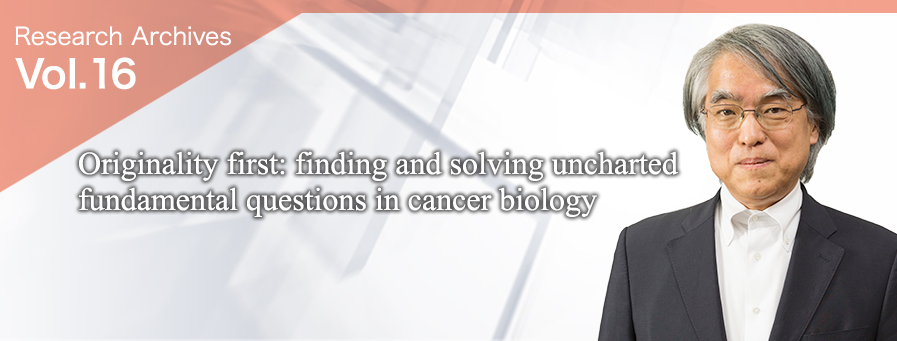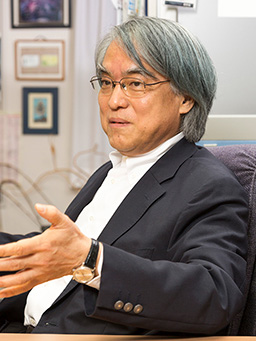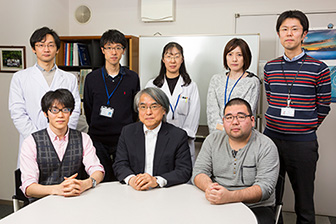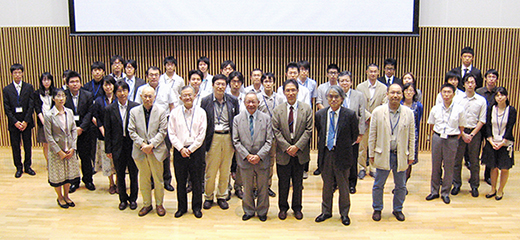
Department of Molecular Biology, Graduate School of Medicine, Hokkaido University
Hisataka Sabe, Ph.D.Physiological
Science
March 2022: Retirement from his position at Hokkaido University
- 1986: Assistant Professor, Kyoto University School of Medicine.
- 1990: Postdoctoral Fellow, Molecular Oncology Laboratory, The Rockefeller University.
- 1993: Assistant Professor, Molecular Oncology Laboratory, The Rockefeller University.
- 1994: Associate Professor, Institute for Virus Research, Kyoto University.
- 1998: Head, The First Department, Osaka Bioscience Institute.
- 2009-present: Professor & Head, Department of Molecular Biology, Hokkaido University Graduate School of Medicine.
Cancer malignancy, metabolism, and immunity: long-standing essential questions in cancer research
 “It’s exciting to concentrate on writing scientific papers that describe our discoveries, and this is actually the time when we ourselves begin to fully understand the true significance of the discoveries” says Professor Hisataka Sabe of the Department of Molecular Biology. “The excitement of research lies not only in obtaining results from experiments, but also in imagining what is yet to be discovered. Assuming that the result of ‘A’ is ‘Z’, constructing a hypothesis and a working model is essential to explain why ‘A’ results in ‘Z’. The process of hypothesizing is where the originality and competence of individual scientists are tested. In fact, there is nothing better than producing research findings in which you can become engrossed in your study, and when your results can be applied to save patients’ lives.”
“It’s exciting to concentrate on writing scientific papers that describe our discoveries, and this is actually the time when we ourselves begin to fully understand the true significance of the discoveries” says Professor Hisataka Sabe of the Department of Molecular Biology. “The excitement of research lies not only in obtaining results from experiments, but also in imagining what is yet to be discovered. Assuming that the result of ‘A’ is ‘Z’, constructing a hypothesis and a working model is essential to explain why ‘A’ results in ‘Z’. The process of hypothesizing is where the originality and competence of individual scientists are tested. In fact, there is nothing better than producing research findings in which you can become engrossed in your study, and when your results can be applied to save patients’ lives.”
Professor Sabe, who has been the head of the Department of Molecular Biology since 2009, has worked to elucidate the molecular mechanisms involved in the malignant evolution of metastatic breast cancer, renal cancer, and pancreatic cancer, and has identified the common fundamental mechanisms that drive the malignancy and drug-resistance of these intractable cancers. Dr. Sabe’s research achievements include 1) the discovery of a new signaling pathway specific to cancer invasion and metastasis, and 2) the elucidation that the small G protein Arf6 is essential in promoting cancer malignancy, as well as drug-resistance via its involvement in mitochondrial dynamics and metabolic remodeling. His findings have invariably attracted media attention because they raise expectations for clinical applications.
Of particular interest is that Professor Sabe and his colleagues at the department found in 2016 that lysophosphatidic acid is the major factor promoting renal cancer malignancy, in which the major factors that externally drive malignancy had remained unknown. They also discovered that statins, which are drugs that lower blood cholesterol levels, inhibit the invasion, metastasis, and drug resistance of certain types of breast cancers. This study was recognized for its excellence by the American Association for Cancer Research. Furthermore, in the May 2017 edition of Cytoskeleton Newsletter (a US company’s online newspaper), six of the 17 articles cited in a feature article of Arf6 were those published by the Sabe group, thus showing the presence of Professor Sabe as a global leader in the research on Arf6 and cancer malignancy.
At present, Professor Sabe and his colleagues are writing several papers describing the malignant progression of pancreatic cancer and its resistance to treatment. Hopeful of the positive impact of their findings, Professor Sabe remarks, “In many cases, ductal pancreatic cancer has already invaded other organs by the time of diagnosis. It also shows strong resistance to anticancer drugs and radiation therapy. Although these issues have already been well-recognized generally, we have identified a molecular mechanism that promotes the malignancy of ductal pancreatic cancer, and this mechanism is an effect of the driver oncogenes of this cancer. If our findings can help establish precise criteria of cancer malignancy, this will greatly contribute towards the further development of precision medicine for pancreatic cancer”. Looking into the future, he also adds, “What is needed in current cancer research is an understanding of the effects of nutritional conditions, metabolism, and immune activities of each patient, to improve the efficacies of clinical treatments. For such research, various projects from novel viewpoints have been started in various fields of basic research.”
The laboratory has a pleasant atmosphere and all the members, including young students, actively pursue research originality through daily discussions.
 The department now includes four staff members, four graduate students in the MD-PhD course of Hokkaido University, as well as eight undergraduate students. They are involved in world-leading studies in cutting-edge fields, including research on the intracellular transport of proteins involved in oncogenesis, the association between mitochondrial dynamics and metabolic reprogramming, which control the functions and morphology of mitochondria (which are essential for life) and thereby promote cancer malignancy. Their current studies also include research into the mechanism of genomic integrity and maintenance, which appears to be crucial for regenerative medicine, including iPS-based issue/organ engineering.
The department now includes four staff members, four graduate students in the MD-PhD course of Hokkaido University, as well as eight undergraduate students. They are involved in world-leading studies in cutting-edge fields, including research on the intracellular transport of proteins involved in oncogenesis, the association between mitochondrial dynamics and metabolic reprogramming, which control the functions and morphology of mitochondria (which are essential for life) and thereby promote cancer malignancy. Their current studies also include research into the mechanism of genomic integrity and maintenance, which appears to be crucial for regenerative medicine, including iPS-based issue/organ engineering.
Professor Sabe notes, “We have been designing our research mostly based on our own findings during the past two decades. This way of doing science, rather than pursuing the results and discoveries of others, makes us feel truly comfortable”. The idea of the lifelong pursuit of research with originality is similar to the research approach by Dr. Hidesaburo Hanafusa (1929-2009), to whom Professor Sabe has looked up to as his mentor since his years at The Rockefeller University in New York. Dr. Hanafusa’s motto was, “Strive for originality in research without following in someone’s footsteps”. He was one of the world’s greatest virologists and molecular biologists and became the first Japanese to receive the prestigious Albert Lasker Award for Basic Medical Research in 1982 for the discovery of the cellular origin of oncogenes. Professor Sabe says, “Sometimes people may consider our, as well as Dr. Hanafusa's approaches as stubborn and not in step with the times—far from it. Thus, we always consciously make efforts to use the most recent technologies and methods as quickly as possible”.
“While making steady efforts in our studies every day, we always try to foresee the results. We discuss the approaches that are theoretically possible, even for problems for which we have no answer for right now, to advance our research to the next stage.” During their free time between experiments, the young staffs and graduate students at the department devote themselves to studying subjects, such as mathematical biology and physics. Professor Sabe says, “Our laboratory has a pleasant atmosphere with all of us engaged in research surrounded by positivity. We are also actively involved in exchange with other scientists in Japan and beyond, working to build friendship, for example, by dispatching our School of Medicine students to a summer student at the University of Oxford.”

(Interviewed in December 2017)
A workshop with top-level scientists providing an inspiring experience for students

Professor Sabe and his colleagues have organized the Signaling Network Workshop annually for the past 15 years, offering a platform for exchange for scientists at the forefront of their fields in Japan and for students. The workshop, which attracts approximately 100 participants every year, provides an inspiring experience for students through presentations and discussions with professors, staff members, and graduate students of other laboratories in a very open atmosphere. Professor Sabe also serves as a board member of the Japan Society of Cancer, Inflammation and Metabolism, which is hosted by Dr. Hiromi Wada (Proffesor Emeritus of Kyoto University), who advocates the effectiveness of better eating habits on cancer treatment. Professor Sabe, along with the graduate students and other members of the department, offers educational lectures to members of this society and young physicians, and streams the lectures on the internet.


